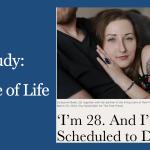Continuing the theme I began in an earlier post regarding leisure, a question arose with respect to what kind of activity constitutes leisure. The claim was made that leisure is that time when one is free from the burdens of toiling and laboring for the necessities of life and free to become fully human through self-perfecting actions. With the focus being on the ‘self’ there was some concern that one’s pursuit of self-actualization actually becomes self-ish. As I suggested and continue to maintain, an answer to this question (viz., what activity constitutes leisure?) ultimately requires an understanding of human nature, for it is the perfection of that nature with which one is concerned. Here I wish to claim that, without a doubt, one’s nature as a person is inherently social and cannot be overlooked with regard to one’s self-perfection. Because of one’s social nature one’s self can only find its perfection and fulfillment within a community of persons. Indeed, if, as John Paul II argues so many times, a person can only fully find himself (i.e., reach his end or achieve his perfection) through making of himself a sincere gift, then this necessarily presupposes a recipient for that self-gift, an ‘other.’ As such, self-perfection presupposes and demands friendship.
I should point out, of course, that ‘friendship’ is not a univocal term since it applies validly to a great number of different kinds of relations among persons: between parents and children, spouses with each other, companions, etc. What remains constant within friendship, however, throughout all of its instantiations is the fundamental need that it answers to at the heart of human existence. One not only needs others for those goods essential to one’s own survival—by which communities form in the first place and thereby the common good upon which and within which friendship operates—but, much deeper more intimate than that, one needs the other, his friend, for the perfection of his very being, or as John Paul II suggests in his Theology of the Body, as the answer to ‘personal solitude.’ Such is especially evident if one considers the role that friendship plays in cultivating virtue. One only acquires virtue through acting virtuously; one becomes generous through acting generously, just through acting justly, etc. But how can one be generous unless there is one to whom he can be generous; just unless there be someone to whom he can act justly? Through such actions, one not only establishes his friendship and cultivates virtue, but also achieves his personhood to a fuller degree. In short, friends make friends better people.
Remarkably, though, in our present culture and society the absolute value and necessity of friendship has not received sufficient recognition. All too often friendship is considered as simply a ‘state-of-being,’ as something static that once set in place needs only occasional maintenance. Authentic friendship, however, is constituted through its being an act and must be nurtured. If it arises as a consequence of our communal nature, then there must be something held in common in a deliberate act for friendship to be sustained. That commonality can be something as simple as the presence of both friends to each other, presence in which the joys and hopes, griefs and anxieties of one friend are communicated to the other and, in turn, become his own. Friendship is only revealed, then, and emerges into being through actions, through one’s acts of giving and receiving. This giving and receiving is found in a special way, albeit certainly not exclusively, within the give-and-take of conversation. So central to friendship is conversation that, as Aristotle notes, “Lack of conversation has dissolved many a friendship” (Nicomachean Ethics 8.5).
Unfortunately, our age, like none before it, is one that shies away from the authentic communication of personality. A significant reason for this, I suggest, is the persistent depersonalization and desocialization that through various artificial media, most especially the internet and all that goes along with it. The intimacy that one experiences through face-to-face contact (what was once called “in-person”) is exchanged, and indeed preferred, for the anonymity of the web. Where there is anonymity there are no consequences for there is no responsibility. Now, lest there be any confusion, I am certainly not saying that a necessary and direct consequence of the internet is depersonalization, that its use will necessarily contribute to the deterioration of society. In fact, personal relationships can be wonderfully aided through those technologies that the internet provides. However, the sad fact is that, more often than not, those technologies become, for many, a kind of surrogate for that which only an intimate and incarnated personal relationship can offer. It all too often impedes the nurturing of extant personal relationships, providing instead the temptation for one’s becoming completely absorbed and neglectful of his relations. Through one’s growing immersion in the cyber-world one becomes absent not only to others but also to himself. Again, lest there be any misunderstanding, I am not condemning anyone, I am not saying that all who use cyber-technologies are headed down, with all haste, the disastrous alleyways of depersonalization. I am not reaching out to point an accusing finger at anyone but only to point out an approaching danger looming over the horizon to which we must pay heed.
No doubt, there is a grave irony, indeed a kind of inauthenticity, in this posting since it makes use of that which it finds prone to contempt, by means of a format (blogging) that has been described as particularly worrisome, and posted under the anonymous conditions of a pseudonym, “Anxietas,” which anonymity was decried as a flirtation with irresponsibility. I admit this irony. And so, rather than live playfully within this tension of the ironic, I shall put my money where my mouth is and make this my last posting on Vox Nova, or upon any other blog for that matter. I shall take my own advice and seek to foster and nurture those relationships with which I have been blessed and which constitute the very heart of my personality, which will carry me beyond the logout and login screen to the interiority of my being and, beyond that, to my last end. I wish you well.
















